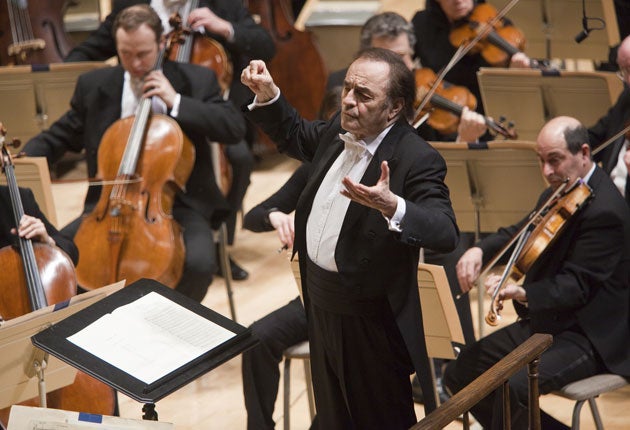Don't stop the music: beloved US orchestra forced into bankruptcy

The Philadelphia Orchestra, one of America's most prestigious ensembles and a favourite among classical music lovers around the world, not least in Britain, is expected to file for bankruptcy this week in a desperate effort to pull itself back from the brink of extinction.
Known among its fans as the "Fabulous Philadelphians", the orchestra, founded in 1900, has seen its financial position deteriorate rapidly in therecent recession and an economic recovery that remains anaemic. Officials said it was running a very large deficit and risked running out of cash to pay its musicians.
The decision to seek bankruptcy protection – unprecedented among large US orchestras – was taken at an emotional board of directors meeting on Saturday. As board members arrived at the offices of a law firm to participate in the vote, they were met in the lobby by some orchestra members playing funeral dirges.
A spokesman said the bankruptcy filing would not affect this year's calendar of concerts. Indeed, patrons filled its home, Verizon Hall in Philadelphia, on Saturday night for a performance featuring works by Mahler. Among commitments the orchestra is still expected to honour is a 7 September appearance at the BBC Proms at the Albert Hall. It is five years since the popular Philadelphians have performed at the Proms.
As with any company, the acceptance of bankruptcy protection is a chance for the orchestra to restructure to reduce liabilities and future costs, for example by avoiding some of its contract obligations, and thus return to long-term viability. "It isn't going to be easy, but I believe we can do it," said Richard Worley, the chairman of the board.
The move has been vehemently opposed by the orchestra's members, however. Aside from the psychological impact of being declared bankrupt, there is also the fear – almost certainly justified – that a bankruptcy judge will allow management to tamper with its pension obligations to them.
John Koen, the chairman of the player's committee, said management had not "turned over every stone" to get the books back into balance and the filing risked sending players elsewhere.
"I know a lot of players who are considering auditions for other orchestras, and I hope that we will not lose the great orchestra we have," he said. "If we do, what is the point of all this? Who would care about funding a second-rate orchestra?"
There was similar note of concern from the chief conductor, Charles Dutoit. In a note sent to the orchestra and obtained by the The Philadelphia Inquirer, he said: "I feel overwhelmed and horrified by the events of the past few days, and I cannot yet grasp what the consequences of today's vote will be." He added: "I am speechless at the moment but wanted you to know that you are in my heart, in my thoughts."
For Philadelphia, the mere possibility of losing what may be its only cultural jewel that can unimpeachably call itself world class will turn stomachs. However, the drama surrounding its future is merely a slightly more stark reflection of the difficulties besetting many other top-rank orchestras in cities such as Boston, Cleveland and Pittsburgh, as well as other arts institutions.
When the vote came, all five player representatives on the board voted "no". But one board member, Carole Haas Gravagno, whose husband used to be an orchestra member, told the Inquirer she had changed her mind. "I was not in favour of it, but I don't see any other solution at this point. We're running out of money," she said.
The orchestra is going ahead with the biggest fund-raising campaign of its history, seeking $160m (£98m) from supporters. It remains to be seen, however, whether philanthropic organisations and individuals (never mind subscription ticket buyers) will be willing to support a body that is now on the record as fighting for its life.
A sound footing
Founded in 1900, the Philadelphia Orchestra first achieved international fame under the leadership of the brilliant and eccentric British-born conductor Leopold Stokowski. His tenure led to the creation of the much-imitated "Philadelphia Sound" – a distinctively lush string effect. Stokowski's instinct for showmanship – he would conduct without a baton – also helped to raise the profile of classical music in America.
The orchestra was one of the first ensembles to make commercial recordings in the 1920s, and was also featured in Disney's Fantasia film, where Stokowski appears as the maestro shaking hands with Mickey Mouse.
In the second half of the 20th century, the Philadelphia confirmed its reputation as one of the world's great ensembles, and the most well-known symbol of classical music to American audiences. Under the guidance of the Hungarian-born conductor Eugene Ormandy, it specialised in the repertoire of 19th-century romanticism. In the 1970s, the Philadelphia even became an instrument of Cold War foreign policy, as the first Western symphony orchestra to tour Communist China and Vietnam. In Beijing, the orchestra performed "The Star-Spangled Banner", and received a personal greeting from Chairman Mao's wife Jiang Qing.
More recently, the "Fabulous Philadelphians" have struggled with declining audiences and reduced donations from sponsors and philanthropists. Musician and staff salaries have been cut, and the orchestra's recording contract has lapsed.
Join our commenting forum
Join thought-provoking conversations, follow other Independent readers and see their replies
Comments